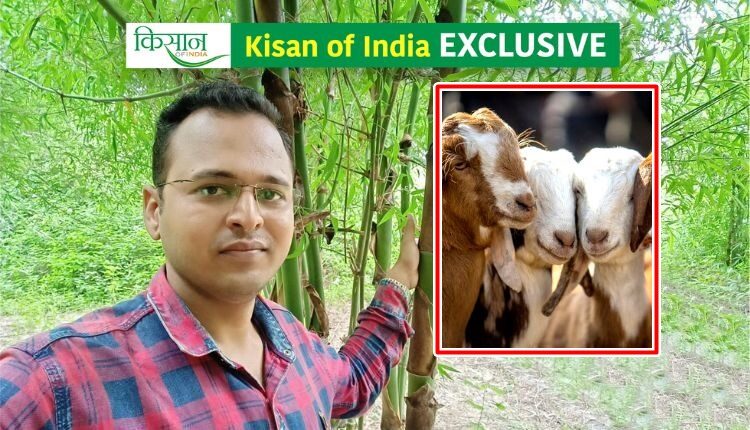What is relationship between bamboo cultivation, goat farming?
Nilesh emphasized on the cultivation of bamboo in his area, today he is working on bamboo processing unit by forming a group of farmers
The government is also promoting bamboo cultivation under the Bamboo Mission as it can become a source of additional income for the farmers. Bamboo plant is such that once planted it is useful for generations. Bamboo cultivation does not require much water. It is also called green gold. Nilesh Dattatreya Nandre, a resident of Nashik, is working to bring many properties and benefits of this green gold to the farmers of his area.
In an exclusive conversation with Kisan of India, Nilesh told that when he started working in the field of bamboo production in 2016, there was less rainfall in North Maharashtra. Due to this the farmers had to suffer crop loss. The income was much less than the cost. The farmers of the area, facing the problem of water, had started getting disillusioned with farming. People started moving to cities in search of employment. Seeing such crisis in his area, he worked to connect more and more farmers with bamboo cultivation.
Intent is to resolve the problem of farmers
Nilesh has done his post graduation in Agri Business Management. During his graduation from Maharashtra’s Agricultural University Mahatma Phule Krishi Vidyapeeth, he used to see how farmers come to seminars and meetings and talk about their problems. Nilesh’s mind always wanted to solve the problems of the farmers. For this he went from Madhya Pradesh to Hyderabad. Nilesh also took training from MITCON, Pune under the Agri-Clinic and Agri-Business Center scheme. Then he worked further to create awareness about the production of bamboo.

Once a bamboo plant is planted, it can give yield up to 90 years.
Nilesh said that once planted bamboo is a profitable plant for 40 to 50 years. It can even go up to 90 years. Initially, when he told the farmers of his area Sakri tehsil about the benefits of bamboo cultivation, the farmers were hesitant. Then he started bamboo cultivation from his own farm and assured the farmers that its cultivation can benefit you in many ways. Today he gives advice on bamboo production in his area and in many districts of Maharashtra. Nilesh further told us that the bamboo market is also good. Paper industry, furniture, handicraft industry and bamboo waste can be used to make charcoal.
Bamboo crop is ready for harvesting in the fourth year
Nilesh explains that once the bamboo crop is planted, it is ready for harvesting in the fourth year. So, after four years, farmers can earn income every year after harvesting it. Nilesh has started working in the direction of converting bamboo crop yield into profit right from the defining, even in first four years.
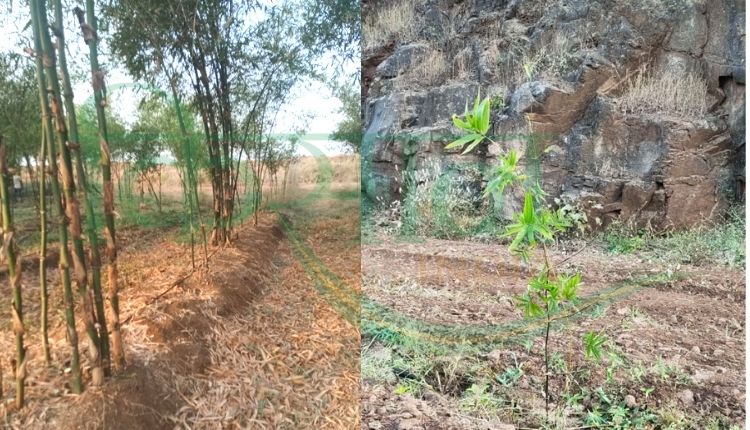
Goat rearing can be done at low cost with bamboo cultivation
Nilesh is working on ways to get farmers to rear goats while cultivating bamboo. Along with bamboo cultivation, if you want to earn profit in goat rearing, then take training from ‘Goatwala Farm’, make Deepak Patidar honoured with ‘Bakri Pandit Award’, your guru. Bamboo leaves serve as shade. The availability of water is also maintained through drip irrigation method. With this, there will be no need to build a shed to keep the goats separately and there will be water around. In this way the cost of goat rearing will come down. This will provide another good source of income to the farmers. Farmers can earn an income of 25 thousand to 30 thousand in a month.
Nilesh explains that in bamboo cultivation, if a distance of 15 feet between two lines and 8 feet between two plants is kept, then many more crops can be planted in it. Drumstick farming can be done. Drumstick comes in the diet given to goats. After starting goat farming from bamboo cultivation, once the income starts coming, then it can be taken on a large scale.
Nilesh says that youths in the age group of 25 to 35 years who go to cities in search of work, they hardly get a salary of 8 to 10 thousand rupees. But by rearing goats, they can make this earning from 25 thousand to 30 thousand rupees. Nilesh says that these youth are the future of the country and if they get encouragement, then they have the ability to make big contribution in the development of the village.
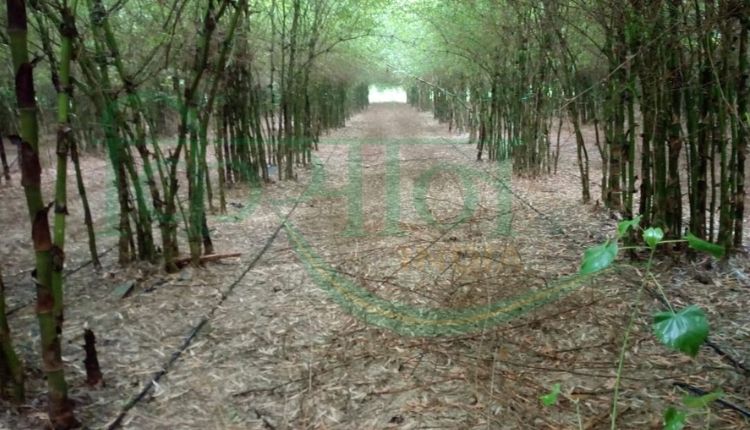
How is bamboo harvested?
Nilesh told that after the arrival of bamboo crop in the fourth year, the entire bamboo need not be harvested. The poles which have grown fully in the bamboo plant, they have to be cut. After four years, at least 40 big and fine bamboo sticks emerge from a single bamboo plant. Poles are harvested every year by the method of 10+2. In the first year, 10 well-ripened bamboo sticks are harvested. In the second year other bamboos start coming from the point where you harvested. In the second year, 12 ripe sticks are harvested from the remaining sticks of the first year. In the third year, 14 sticks are harvested again. In this way, the harvesting of bamboo continues year after year.
There is no disease in bamboo crop
In many other crops the field has to be prepared every time, but nothing like this happens in bamboo cultivation. Nilesh said that the bamboo crop does not suffer from diseases and pests and there is no danger or harm by animals. Nilesh says that bamboo cultivation can be started at a cost of Rs 15,000 per acre. Farmers can earn at least one and a half to two lakhs per acre every year from its cultivation.
Bamboo can grow in any climate
Nilesh further says, we have seen that bamboo plant can grow even on sandy land of Gujarat. Its crop can come in any climate. It is quite possible that where there is less rain or less soil, then harvesting season can extend for a couple of years. Bamboo production can be taken even on barren land. Bamboo plant releases 33% oxygen. Because of this it is also good for the environment.
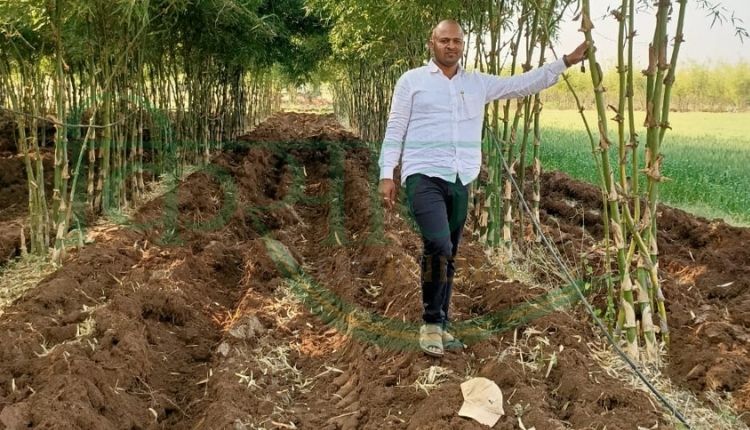
Nilesh is helping farmers to open FPO
Nilesh further said that the government is also promoting its production under the Bamboo Mission, which is a good step. Many bamboo based industries are also being promoted under the self-reliant India campaign. One of these is incense sticks industry. For the development of incense sticks industry, some restrictions have been imposed by the government on its import. This has accelerated the manufacture of incense sticks in India today.
The demand for incense sticks has increased over the years. The total consumption of incense sticks in the country is about 10 lakh kg per day. Besides incense sticks, Nilesh is engaged in the task of setting up processing units for bamboo growing farmers of his area to make charcoal, furniture, etc. They are working to connect thousands of farmers with these works through FPO (Farmer Producer Organizations).
What is FPO?
FPO i.e. Farmer Producer Organization (Farmer Producer Company) is a group of farmers, who are engaged in agricultural production work and carry out business activities related to agriculture. Farmers who produce agricultural products can form a group of their own and get them registered under the Indian Companies Act. This will not only make it easier for the farmers to get a market for their produce, but it will also be easier to buy financial assistance, fertilizers, seeds, agricultural equipment, etc.
Nilesh says that 10 to 12 farmers can start processing units on a small scale through FPO size simultaneously. Nilesh also helps the farmers in this. He works with farmers on different aspects, from FPO registration to cost and product making training, etc.
Grow bamboo with the cultivation of other crops
Giving advice to the farmers who are interested in bamboo cultivation, Nilesh says that farmers who are cultivating other crops can plant bamboo inside their fields in the ratio of 15 by 8. Its market will never end. If you grow one acre of bamboo along with other crops, you can sell your bamboo to farmers cultivating vine crops. You can also sell your bamboo on a small scale to those making bamboo products such as mats and chairs.
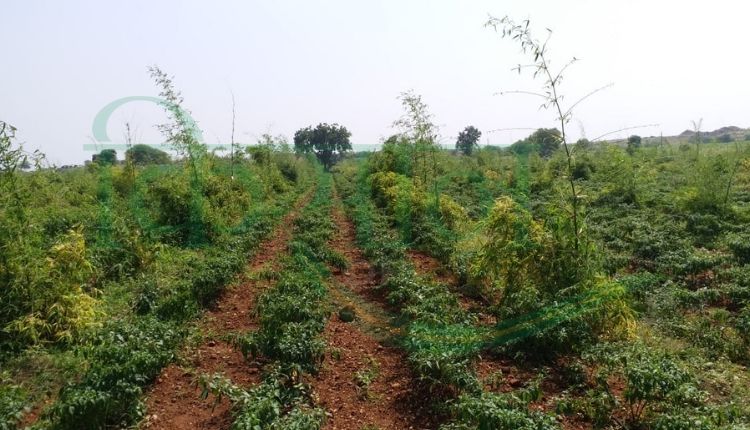
Bamboo market is very big
Nilesh said that 40 to 50 tonnes of bamboo is produced per acre in the first year of harvesting. As the age progresses, the size of the bamboo increases by up to 25 percent. Then from the second year onwards, the harvesting reaches around 100 tonnes. Nilesh says that if the farmer himself takes his crop in the paper industry or furniture industry in his area, then bamboo is bought at the rate of Rs 4,600 per ton. If the businessman himself picks the crop from the farmer’s place, then a price of Rs. 2,500 per ton is available.
Also sell organic fertilizers to farmers at low rates
At present Nilesh is running two companies. The bamboo work is handled by the firm ‘Shivambhu Agro Search’. Apart from this, ‘Krishi Sankalp India’ company works in the field of organic manure. Products like Vermicompost, Vermi Wash are made available to the farmers at low rates. To improve the lifestyle of the people living in tribal areas, he also makes them aware about bamboo production. Today they are making good profit bamboo, grown in less water and with low cost.
Contact us: If farmers want to share information or experiences related to farming with us, then they can do this by calling us on the phone number 9599273766 or by writing an email to kisanofindia.mail@gmail.com or by sending your recording. Through Kisan of India, we will convey your message to the people, because we believe that if the farmers are advanced then the country is happy.
You can connect with Kisan of India on Facebook, Twitter, and Whatsapp and Subscribe to our YouTube channel.

